How to tame and train chickens. With an 8 week guide.
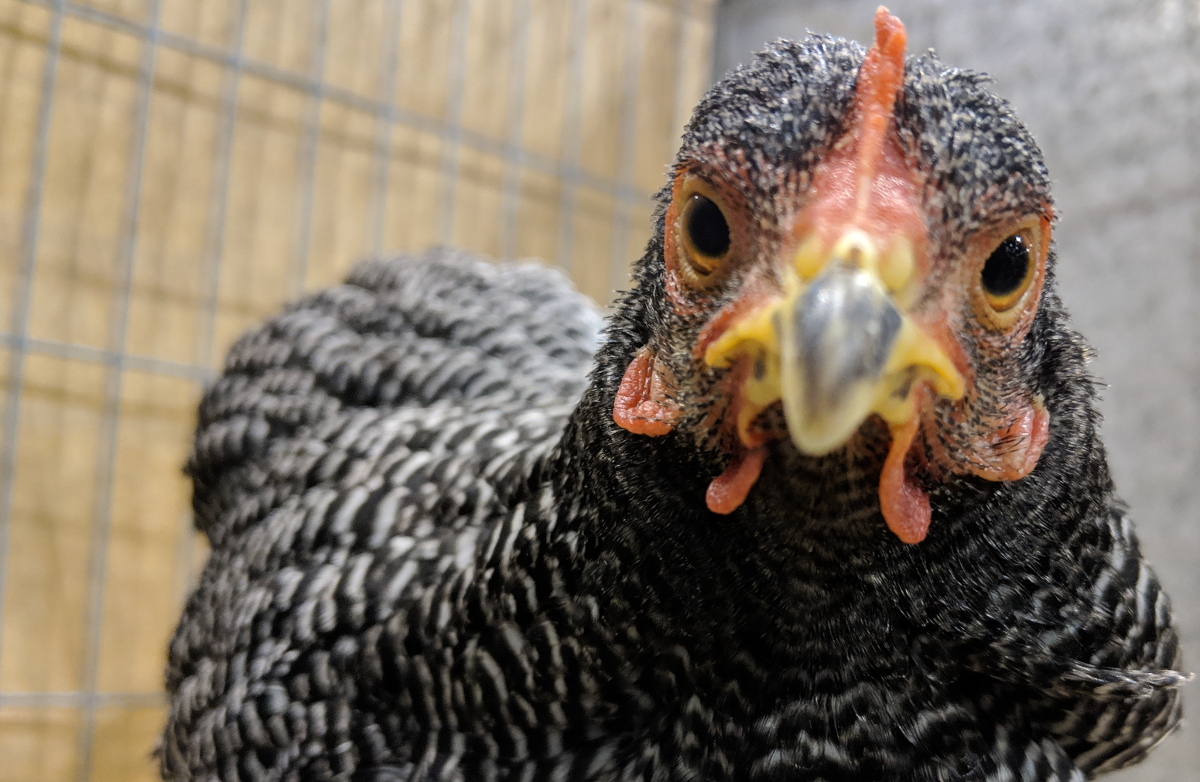
How to tame and train chickens. With an 8 week plan.
I get quite a few questions and emails from people who are quite happy with their hens but disappointed that the either don't come running to see them worse still are actually scared of them and move into cover when they are around.
Taming chickens to a basic level is relatively easy and can be achieved in a few weeks but It does take a little patience and a few treats.
Below: Most keepers want their hens to be tame pets as well as egg producers.
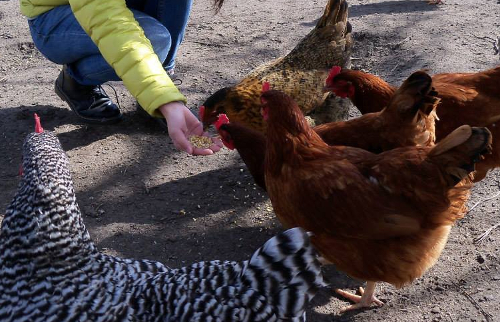
Chickens are quite sensitive and stay away from people in the wrong frame of mind. I find If I'm in a bad mood or annoyed then my chickens behaved differently around me.
Table of Contents
- How to tame and train chickens. With an 8 week plan.
- How do you get your chickens to trust you?
- Do chickens recognize their owners?
- Do chickens like being petted?
- Do chickens know their names?
- Can chickens be tamed?
- What are the easiest breeds of chickens to work with?
- Do chickens bond with humans?
- The 8 week plan to tame chickens:
Most chicken keepers today want to keep friendly tamed chickens that are calm relaxed and friendly and easy to interact with. It all depends on how the owner raises them, they aren't hatched friendly and need some time and training.
The procedure is much the same if you have bought POL or full grown chickens. If you have bought point of lay hens or fully grown birds then skip through to week eight and beyond. Hungry chickens will be more brave and likely to come to you for food but do not let them starve.
Below: If you want the friendliest chickens then start early.
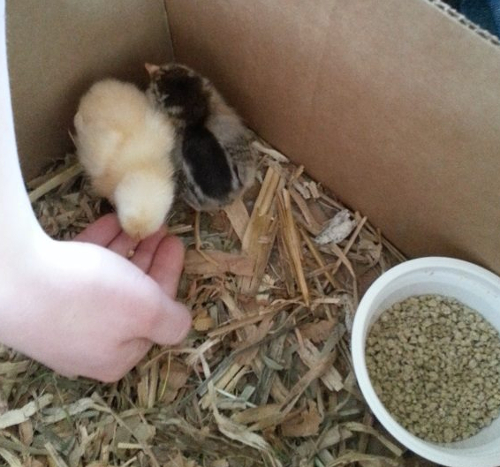
Chickens do not imprint like some birds do on hatching. It takes time for brood mates and parents to get to know each other. This is different from ducks for example where the first thing they see on hatching becomes mum.
We hold our birds often, starting as chicks. Do lots of feet touching, spread wings check tails out. And some scratches on necks! Some are more tolerant of being picked up. But even with more skittish girls, we give them extra hugs daily and after only three or four days they become much calmer. Our speckled Sussex loves to wander up to porch whenever we come outside to see what we are doing.
Young chicks as a general rule are quite trusting but around week 4 or so they develop a tendency to scare easily and even avoid their human keepers. All chickens are different and some never go through this stage just a s some never get out of it.
How do you get your chickens to trust you?
It is likely that if you have just got new chickens they will be wary of you at first. Getting your chickens to trust you takes mostly time and food. Patience and a few treats are the way to your backyard flocks heart.
Below: Chickens love gardening ( they eat the bugs) and this is a good way to get them used to you.
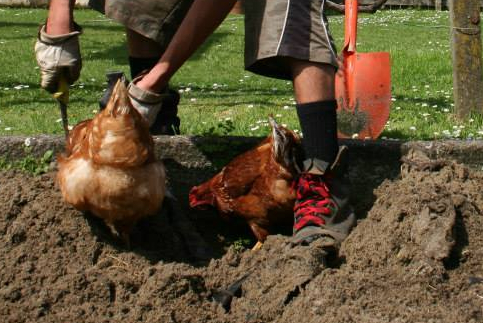
You should make sure that you don't startle your birds by appearing on them suddenly as this could panic them and if you do it often enough they will associate your arrival by responding like you are a predator.
Ways to get your chickens to trust you:
- Sit with them in their space and let their natural curiosity get them better of them.
- Routine. Call for them with their morning feed so they associate you with food.
- Treats. Doesn't need to be anything special, even defrosted peas or sweetcorn will do.
Things to avoid if you want your chickens to trust you:
- Avoid grabbing at them or holding them by their feathers.
- Don't startle them or make sudden movements.
- Avoid the head, Chickens peck at the head or pull head feathers when establishing a pecking order or fighting.
Chickens learn fast and will start coming up to you when you walk into the pen.
Single birds hate to feel like they are missing out so once one comes running to you they will all begin to.
Do chickens recognise their owners?
Yes they do. When I get new chickens it takes them between 2 and 4 weeks to become completely accustomed to having me around.
It may be that chickens can recognise your face but it is more likely that it is a combination of factors such as your size, voice and the way you move. Mine also know roughly what time I get to my fields and seem to be ready.
Do chickens like being petted?
Some do and some don't. I have chickens that like to be around me, but on their own terms and others that love to be handled and petted. They might be happy to perch on my knee when I'm sat down with them but will leave if I try to touch them.
Below: This is a friend of mine with a chicken perched on his knee. It loves to be petted.
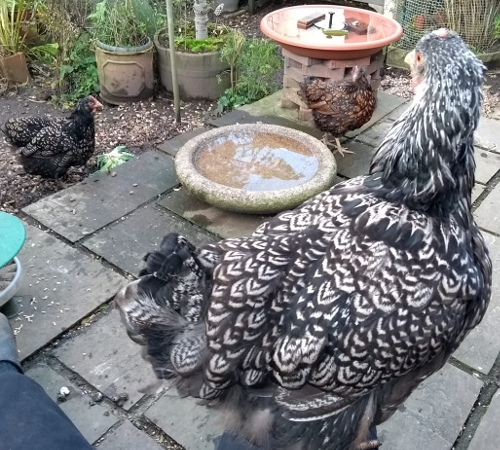
I have a couple that just scream blue murder (English saying - to shout or protest very loudly because you are very angry or feeling a lot of pain) if you pick them up or touch them in any way.
Some hens squat down when you pet them. This is how they react to a rooster that is wanting to mate with them and is a sign of submissiveness.
Do chickens know their names?
No. Chickens know you and the sound of your voice they don't learn their names.
I have named mine for years and none of them ever bothered trying to learn their own name.
Your chickens will come to you when they hear your voice, even if you are calling their names.
Try a little experiment - Call our random words in the same tone you use their names and they will still come running.
Can chickens be tamed?
Yes, a little time, patience and a few treats is all you need to tame your chickens. Remember not to make any sudden movements and stay calm, the chickens can spot a bad mood or agitated person a mile away.
Chickens can be tamed using the same methods you would use to train the family pets like cats or dogs. Not all chickens appreciate petting and cuddling the same way a dog or cat does, but it is both possible and quite simple to tame chickens to be friendly.
Below: Friendly tame chickens.
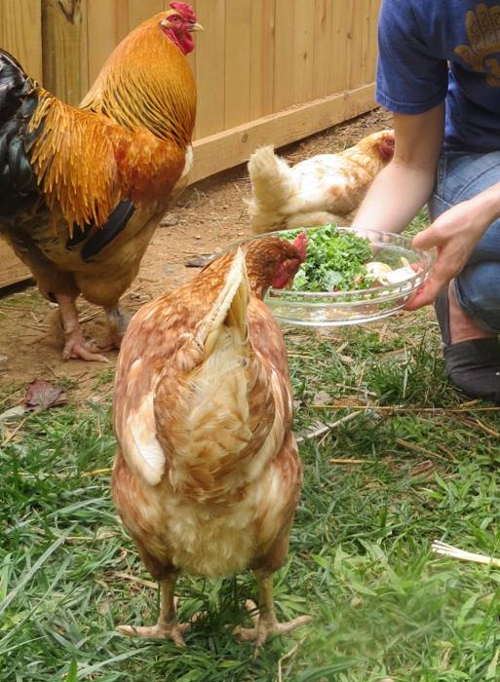
The quickest and easiest way to tame chickens is to start with day old chicks. Handle them from a young age and get them used to the sound of your voice.
How to tame young or baby chickens:
- Start with Friendly stock or a breed know for its good nature.
- Handle them with care as often as you can and get them used to you.
- Always give them a little time to settle into anything new and let them make the first move.
- Feed treats, first from a dish and then your hand if you want to.
- Give them some freedom to explore.
- New foods from an early age. Try dangling a bit of grated carrot in front of chicks and watch the result.
- A dust bath, perches and somewhere to scratch will encourage natural behaviours and help relieve any stress.
How to tame older chickens:
Older birds need treating differently. You need to just sit with them, in the run to start with so as they get used to you just being around. Don't get in the coop with them, they need to be able to move away from you if they want so the bigger run is a much better place to start.
If they are really skittish then just be with them outside of the run so they feel a bit more secure behind the fence.
Can you tame a rooster?
In some senses a rooster is easier to tame and train and in other ways it it more difficult.
Below: This is Teapot, and his owner Tamara, a Japanese bantam rooster living in Hobart, Tasmania.
The ABC did a video about Teapot and I! pic.twitter.com/9KG3MYXlym
— mori🐓teapot (@niwatorichi) November 13, 2019
There are quite a few people who keep a single cockerel as a pet. See the below example.
— mori🐓teapot (@niwatorichi) November 21, 2019
On the other a cockerel with a group of hens is going to be preoccupied doing rooster stuff with his ladies and beyond coming to you for food there is probably not much training that can be done for a cockerel.
How to train chickens to:
Training chickens is a matter of using and guiding their natural behaviours where ever possible. Always use positive reinforcement when training chickens, punishment for not doing never works. Chickens can be trained but only to a limited extent.
Plan to be working on one thing a at time. This is one area where trying to force an issue or trying fight a battle on two fronts is likely to fail.
Train chickens to come when called - This is pretty simple and is accomplished by calling for your chickens in whatever manner you want. Use their names or just call out "chickens" and maybe whistle as well.
Always use the same greeting and feed when they come to you. It doesn't need to be anything special, a little cracked corn or a few peas or sunflower seeds.
Potty or litter tray training chickens - This is practically impossible as my personal thoughts are that chickens can not be housebroken, although is was able to find two cases of people who said they had managed it, one with the use of a clicker and the other reckons the chicken had been watching his cat in the tray. The problem is chickens just go whenever they need to, they even poop in their sleep and have no control over when they go.
I am also sceptical about whether the bird is actually house trained or if the chicken is just perching on the edge of a "litter tray". I have seen the same videos you have of "potty trained" chickens that you have and I remain on the fence.
Train chickens to follow you - Chickens will follow you if they think they are getting something. A little grain shaken in a bag is all I need to make me feel like a chicken version of the pied piper! You can train a chicken to follow you easily
Stay in the yard - Trouble is that the grass is always greener on the other side. Chickens live in the moment and if something looks tasty over the fence then they will go and take a look. I have some that never wander and some I can't seem to keep inside. This is more a matter of clipping a wing to keep them on the right side of the fence rather than trying to train them.
Training chickens to eat from your hand - Once your chickens are used to having you around and come to you when you arrive to see them begin to offer them a treat in your hand. Earthworms are excellent for hand training chickens.
Below: Chickens eating from a keepers hand.
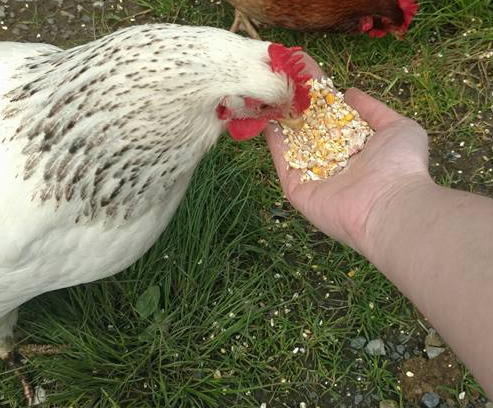
Let some spill over so they can see it and hold it low enough that they will notice. They will either eat from your hand or choose not to. Once one has had a go it is likely the rest of the flock will as well as chickens hate to miss out on food if they can help it.
Clicker training chickens - A chicken on it's own can be clicker trained to peck at certain things like coloured spots or shapes. This is how the bird was taught to play the xylophone in the viral video we've all seen.
Below: This is a chicken that was taught to peck at circles and ignore stars.

You use high value treats like live meals worms and a clicker to reinforced the behaviour you want and ignore the behaviour you don't want.
In the above case they first got the birds used to pecking a mealworm from the testing device, then covered it with paper then added shapes. Only the circles had mealworms under and the chickens learned to ignore the stars.
Walk on a leash - Some chickens do not take to wearing clothing or harnesses and you will know quickly if you have one of these. Remember when walking a chickens on a lead or lead that they do not walk fast and are easily side tracked by almost anything they see.
Below: A rooster going for a walk on a leash.
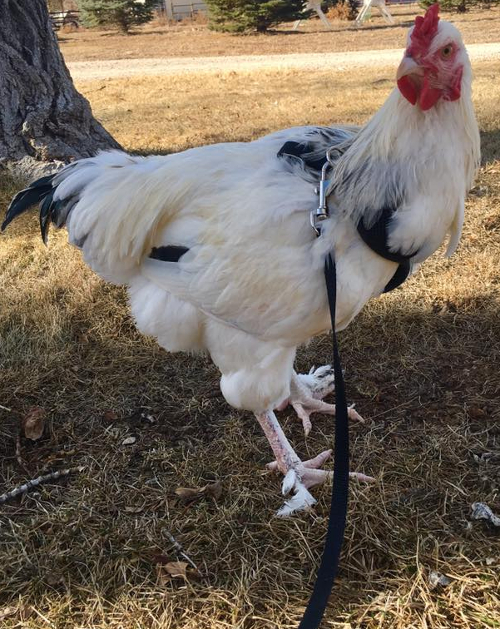
Part 1 of getting a chicken to walk on a leash is getting it used to wearing a saddle or harness. If the bird doesn't settle down in a few minutes then take it off and don't subject the chickens to the torture of wearing something it doesn't want to. Some birds will happily wear a harness, some may scratch it incessantly and some may just stand completely still and some will scream the house down.
Secondly if you have been using the saddle then try putting the bird in a harness. A day or so later try with a leash and see how it goes.
Thirdly you need to get the chicken to walk with you and if you thought the first two sections of the training were hard work then you are in for a shock. They are nothing like dogs which happily walk on a leash and don't walk very fast. You will need treats to get it moving and the patience of a saint. Your pupil will want to wander and peck at anything it finds interesting.
What are the easiest breeds of chickens to work with?
First of all, before you start taming your birds, you have to pick the right breed. All chickens are different there are specific breeds that are renowned for being more friendly than others. Silkies and Orpingtons are naturally calm, docile and affectionate.
Game or hard feather fowl are to be avoided birds such as the Malay, Saipan and Shamo are bred to be aggressive, violent and generally mean looking birds and also lack the cuddly soft feathered look. They might be just as tame or friendly but do not always look it. They are also taller which can make them more imposing in stature.
Below: Silkies are known to be friendly and easy to train.
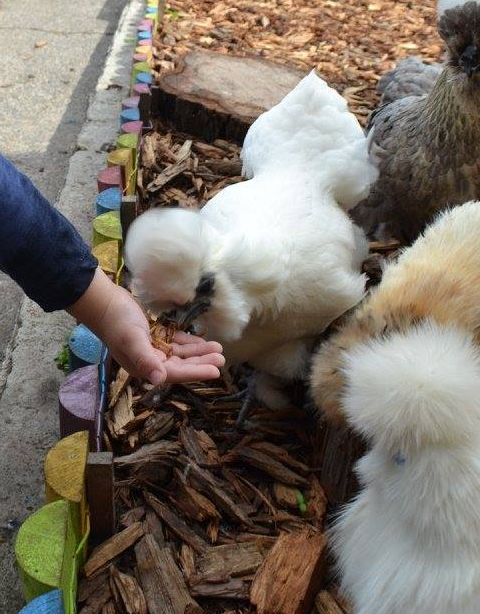
So, when choosing chicken breeds, do a little research and find out what breeds will best fit your needs. Start looking at Brahma's, Silkies and Wyandottes or Barnevelders and don't discount bantams, my little barny bantams are some of the friendliest birds I have ever had.
If you are raising meat birds I would avoid getting too attached to them.
Do chickens bond with humans?
Yes chickens do bond with humans, generally only the backyard keeper and the family. They might run over to a stranger to see if they have food and may even be friendly to strangers. Your bond with chickens is formed over time as you look after them.
The 8 week plan to tame chickens:
The plan for taming chickens that are fully grown when you get them never really changes, it involves 8 weeks or so of patiently being with your flock and getting them used to you. Use treats to entice them to you and eventually to eat from your hands if that is what you want. There is no magic secret to taming chickens just routine process.
Week one:
You need to start interacting your chicks as soon as possible, preferably from the moment they are fluffy and ready to leave the incubator or the day they arrive or you collect them.
Do bear in mind if they have travelled they may be cold, hungry, thirsty and stressed so be careful. I begin by just putting my open hand in with the chicks with the fingers pointing down so the chicks can wander underneath the hand a feel the warmth.
However, on the day they either arrive or you buy them, try not to touch and cuddle them much or try to push them too far, stop if they start piling in the corners or shouting/bleating loudly.
They need this time to get acquainted with their new home and siblings and you don't want them to react to you by running away and piling in the corners.
The second or third day is when you should start touching, holding and talking to them, getting them used to the sound of your voice means they will come running to you when they they hear you and associate you with food. start to use one specific call or whistle whenever you see them and they will begin to associate you and that call with food and treats. When speaking, remember to talk softly, soothingly and quietly, do not shout or make quick movements. If you ever have heard how a mother hen talks to her chicks, she clucks softly and makes purring sounds a little like a rusty gate or asthmatic kettle.
Note that whenever you reach into the brooder, your chicks will more than likely scatter and freak out. This is normal behaviour. They assume your hand is a predator (like a swooping hawk) and have the immediate instinct to hide. So try and reach in slowly while speaking calmly and try just offering a finger for them to peck at.
Then slowly pick the chick you want. If your chicks still seem very frightened then put your hand in the brooder often. Talk to them but don't touch them. Soon they might even come and stand in your hand.
You can also try putting feed in your hand so they soon will associate your voice and hand with food.
Week two:
From day 7 get the chicks out of the brooder for a small field trip each day on the living room floor or if the weather is nice and sunny outside to the grass. Lay down an old sheet to catch all those accidents if you are indoors! Be very careful when holding and moving chicks out of the brooder that they don't fall to the ground or you don't drop them. They are very fragile and can die from such a long fall or if something heavy falls on them. So go sit on the floor with them
and let them out to run around.
Be patient they will likely run around but will soon start exploring. be a place of safety and and they will trust you.
From week two to four, if the weather warrants it, get them outside for up to an hour. Be with them and and keep them in an enclosure so they don't disappear and to keep them safe from predators.
All these activities create a nice bond between you and your chicks.
Weeks three and four:
This is the age you can easily lose chicks as their instinctive wariness can make them difficult to deal with. It is especially important that they are not startled by you at this stage and that you speak to them as much as possible.
This is that age that your chicks will start acting a bit loony They are hyperactive, curious and busy all day! They probably will no longer be interested in you as much so now is the time to start using treats like sweetcorn and worms. This is the time to train them to come to the sound of your voice by using a standard call which they get fed for and they will come when you call. use a short, quick call which they will easily come to know.
They will be fun to watch. Turn a patch of earth in your garden for them to scratch through and find worms etc., they love a root through freshly turned earth.
Week four to eight:
The reinforcement stage.
Continue the calling and cuddling. Start hand feeding them and your chickens will soon learn that only good things come from you. If you raise your chicks to be friendly from the start then you will have friendly chickens till the end.
Always remember the best way to a chickens heart is through it's stomach.
